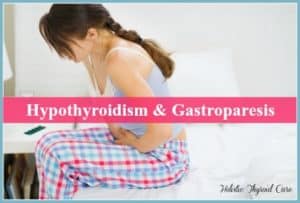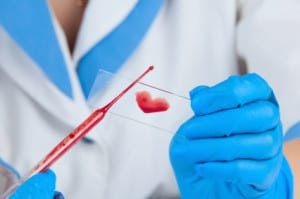
Vitamin D is known as the “sunshine vitamin.” When our skin is exposed to ultraviolet light, a cascade of events occurs to manufacture vitamin D in the body. It’s pretty amazing how it works and the process of making vitamin D also relies on adequate levels of cholesterol and functions of the liver and kidneys. Vitamin D and autoimmune disease have a connection…a deficiency raises your risk for an autoimmune condition.
Primary functions of Vitamin D
Vitamin D assists in the production of calcium, phosphorus and other minerals from the digestive tract. It is necessary for the healthy function of the parathyroid glands, which regulate calcium levels in the bloodstream and is also essential for the health of the thyroid gland.
Vitamin D is very important in infancy and adolescence for proper formation of teeth and bones, and it prevents rickets which is a result of severe deficiency resulting in weakening of bones to the point they become misshapen. It also helps prevent tooth decay and pyorrhea (periodontitis, i.e. gum disease).
Scientists believe vitamin D is a hormone rather than a vitamin since its functions parallel those of hormones. Research scientists are currently working to have vitamin D reclassified as a steroid hormone based on this rationale and since it is derived from cholesterol in the body as are other hormones (Airola, 1996, 2013).
Vitamin D Deficiency
Prolonged deficiency may lead to rickets, tooth decay, gum disease, osteomalacia, osteoporosis, retard growth and poor bone formation in children, muscular weakness, and lack of vigor, deficient assimilation of minerals, autoimmune disease, thyroid disorders and premature aging.
Food Sources

- Sunlight (ultraviolet radiation), fish liver oils, particularly wild salmon, light tuna, sole or Pacific flounder. Light tuna has less mercury than white tuna.
- 2 servings of large free-range chicken egg yolks
- Whole milk
- Pork ribs (3 oz. provides as much as 88 IUs of vitamin D)
- Grass-fed butter
- Sprouted seeds
- Shitake mushrooms
- Grass fed beef liver
- Ricotta cheese
- And because of the sunflower’s close affinity to the sun, sunflower seeds are an extremely rich source of vitamin D, being one of the very few plants containing vitamin D.
Vitamin D and Autoimmune Disease
There simply is no substitute for ultraviolet radiation found in natural sunlight for our body’s ability to convert cholesterol into vitamin D. The outer membrane of our skin cells contain cholesterol and are primed to receive sunlight in order to synthesize vitamin D in response to sun exposure.
Humans were designed to receive sunlight for this purpose, therefore, it makes sense that it is a vital and critical aspect of health. Research studies (see MS study here via PubMed and RA study here) have found that for example, the incidence of multiple sclerosis (MS) and rheumatoid arthritis (RA) is directly linked to a lack of sun exposure rather than an association with vitamin D supplementation. What is important to understand is that it is the actual sun exposure that allows the body to make its own vitamin D that’s important in reducing risks of MS and RA.
Basically, what researchers are saying is the less sun exposure you have, the higher your risks for getting MS or RA because the environmental trigger for these autoimmune diseases is often inadequate exposure to sunlight. People who live in parts of the world where due to latitude issues they are far from the sun for most months during the year have the highest incidence of MS or RA in their overall population despite supplementation.
The body can only make vitamin D from the last week in March until the first week in October. We need the sun at a 90-degree angle in the Northern Hemisphere to make vitamin D. Even in the winter we can’t grow crops or food or vegetables…and this means that most Americans aren’t making any vitamin D for close to 5 months a year.
This is why so many people get sick in the winter due to compromised immune systems, get the winter “blues” and become ill. And although low vitamin D levels are a factor in triggering many autoimmune diseases, it appears in MS and RA to be directly associated with the lack of exposure to sunlight.
This is not to say that more sun is better because it most definitely is not. Moderation is the key as is the case with most everything. Too much sun as we all know can lead to accelerated aging, skin cancer, and muscle inflammation. I’ve often wondered though in some cases of skin cancer which came first…too much sun exposure or less than optimal vitamin D levels because low levels of vitamin D also predisposes us to skin and other forms of cancer.
And then there are those toxic sunscreens on the market today contain cancer-causing toxic chemicals.
Vitamin D and autoimmune disease have been well researched. Scientists believe there is compelling evidence linking a deficiency as a factor, if not the trigger for the development of an autoimmune condition. Rheumatoid arthritis and MS are autoimmune conditions that are the most prevalent in people who avoid the sun, overuse sunscreen, or live farther away from the equator.
Benefits of Vitamin D
- Vitamin D is responsible for the expression of over 200 genes of some 20,000 to 25,000 human proteins encoding genes that bind to a number of genes associated with autoimmune disease and cancer.
- It regulates important hormones like serotonin (required for mental health & healthy digestion).
- Controls cell growth and are essential for tissue healing.
- New evidence suggests it may prevent cancer.
- Modulates the immune system and the formation of antioxidants.
- It regulates the activity of nerve cells, macrophages, and specialized immune system cells.
- Vitamin D functions in the production of receptors on cells for thyroid hormone T3.
- A deficiency is strongly linked to an environmental trigger for autoimmune diseases such as lupus, type I diabetes, MS, rheumatoid arthritis, celiac disease, IBS, psoriasis, interstitial lung disease and many of the other 100+ autoimmune diseases.
- D is essential for gut health, stress management, hormone regulation and micronutrient deficiencies (vitamins & minerals) and is vital as part of a protocol to heal autoimmune disorders.
- Dr. L. Ray Matthews, assistant professor of surgery at Morehouse School of Medicine and the Surgical Critical Care Director at Grady Memorial Hospital in Atlanta, Georgia is currently working with the government to review protocols to define vitamin D deficiency. His research and published landmark paper describing the benefits of vitamin D’s use in critically ill patients led him to declare a new strategy in his hospital for the use of vitamin D on all patients starting with the staff nutritionist. His findings for the use of vitamin D in the clinical setting include:
- Decreased length of hospital stays.
- Decreased hospital costs.
- Decreased falls.
- Decreased mortality rates.
- Quicker transition off the ventilator.
- Dr. Matthews’ research on vitamin D also extended to athletes and the incidence of sports injuries. He initiated a supplementation protocol at Martin Luther King, Jr. High School in Lithonia, Georgia, and reported an almost 100% reduction in sports injuries and concussions over the past two years.
- Dr. Matthews believes that as technology improves, fewer and fewer Americans are working outside and when we’re indoors, 98% of sunlight is blocked.
Vitamin D and Liver Toxicity
Most of the studies that have been done on fat-soluble vitamins have primarily been done in isolation. Meaning the studies were done only on one specific vitamin; so, in that regard, yes…toxicity is a possibility. Fat-soluble vitamins work synergistically with one another, so it’s important to take them all. For example, consider the following:
- Vitamin D strongly protects against vitamin A toxicity.
- Vitamin A strongly protects against vitamin D toxicity.
- Vitamins A & D increase the need for vitamin K2.
- If you are supplementing with one, it is prudent to supplement with the other.
- Appropriate ratios of the fat-soluble vitamins the way nature intended them for humans is already found in high-quality animal foods especially butter from grass-fed cows.
What to Look for in a Vitamin D Supplement
People often believe the supplement industry isn’t regulated but that’s actually not true. What is true is that manufacturers can put out any kind of supplement they want to produce and it does have to be registered with the FDA; however, they don’t have to prove what’s on the label is actually what is in the capsule or box.
So, when you are looking at some of the higher quality lines of supplements, they will tell you about their quality control, manufacturing and standardization practices and they pass all of their FDA inspections.
A lot of companies say they use only the purest ingredients but they really have to go through a lot of procedures to make that possible. For example, say you’re looking at a label and it says it has vitamin D in it. If the manufacturer gets its raw materials from an outside supplier and if the supplier pre-diluted the ingredient with something else, the manufacturer is not required to disclose that on the label.
Point: Pure vitamin D is 40 million units per GRAM…which is A LOT, so it has to be diluted. High-quality supplement manufacturers dilute vitamin D in their own lab facility – they don’t use outside sources for their raw materials. Some outsourcing companies may dilute vitamin D with lactose, sodium benzoate, sorbic acid (not to be confused with ascorbic acid) or magnesium stearate. So, if it comes from an outside supplier like that, the manufacturer is not required to disclose that information on the label.
This is a significant problem for people with gut issues, allergies and/or sensitivities who are trying to avoid certain substances. It’s really not fair that it doesn’t have to be disclosed on the label but it doesn’t.
It is very important to educate yourself about the supplement brand you use and trust by contacting the manufacturer to find out if they outsource for raw materials or if they use any unnecessary fillers or excipients. Also, always look at the “Supplement Facts” box on the label and locate “other ingredients” to see if there are any unnecessary colors or additives because these are important things to consider.
The reason manufacturers may use certain fillers is because pure powdered ingredients are very dry or sticky with botanical oils and difficult to mix. They may use magnesium stearate, lactose or dextrose to make the powders flow through the machines easier, but that could also inhibit absorption in people with compromised guts. Magnesium stearate is often a substance that people with gut issues are sensitive to and the same goes for lactose, dextrose, sorbic acid, and sodium benzoate.
One sign of a high-quality supplement manufacturer is that ALL of their products are hypo-allergenic.
Choose vitamin D3 liquid drops (water-based) over capsules for optimal absorption and capsules over tablets. Tablets, just like drugs have a pharmaceutical glaze on them, it’s sort of like the shellac you would find on a piece of furniture, so you want to avoid that.
The best and most absorbable vitamin is Hi-Po Emulsi-D3. With a typical dose of 1-2 using 1 to drops per day, the bottle will last almost a year.
A Word about Soy Lecithin as a Filler
- Soy lecithin is not the food protein or isoflavone found in soy.
- Soy lecithin is MANY steps removed from the actual food to the point it does not contain any GMOs, soy protein, or soy isoflavones that cause sensitivity, reactivity, or allergy issues.
- Soy lecithin should not cause any problems because it is literally only the extracted phospholipids from the lecithin.
- Soy lecithin is not inflammatory, whereas soy protein is highly inflammatory.
How much vitamin D do you need?
- Talk to your doctor and aim for the optimal range of 80-90 ng/mL especially if you’ve already been diagnosed with Hashimoto’s or other autoimmune condition.
Exactly what lab test do you need?
- Make sure your doctor orders Vitamin D, 1,25-Dihydroxy, LC/MS/MS which is the bio-active form of vitamin D.
- Vitamin D3 must be converted from vitamin D2, so you want to know how much is free and available. You can order your own inexpensive blood test here.
References:
1. Airola, P. (1996, 2013). Handbook of Natural Healing: How to Get Well. Sherwood, Oregon: HealthPlus.
2. Ballantyne, S. (2013). The Paleo Approach: Reverse Autoimmune Disease and Heal Your Body. Las Vegas: Victory Belt.
3. Health Nuts. (2014, July 9). How to Choose Quality Supplements with Evelyne Lambrecht, Thorne Research. Retrieved from https://itunes.apple.com/us/podcast/health-nuts-podcast/id605570630?mt=2.
4. Matthews, L. R. (2013). Wellness Profile: Dr. L. Ray Matthews Unleashes the Power of Vitamin D. Life Extension Foundation. Retrieved from http://www.lef.org/magazine/mag2013/oct2013_Dr-L-Ray-Matthews-Unleashes-the-Power-of-Vitamin-D_01.htm.
5. Department of Biochemistry, University of Wisconsin, Madison. A unifying multiple sclerosis etiology linking virus infection, sunlight, and vitamin D, through viral interleukin-10.2008;71(1):85-90. doi: 10.1016/j.mehy.2008.01.031. Epub.






I take the liquid Vitamin D3 drops also…I have been diagnosed with Raynaud’s & Sjogren’s, have seen a Rheumatologist. They suggest Rx & I do not want to put any of that in my body, therefore trying to rid myself of these on my own by alternative/natural ways. I do not have any answers, what would you suggest. I would truly appreciate any information you can give. Thank you.
Hi Suzann,
Thanks for stopping by and sharing your comment. Vitamin D has shown to help modulate the immune system in most autoimmune conditions. Let us know how it helps you. 🙂
Thanks for sharing..